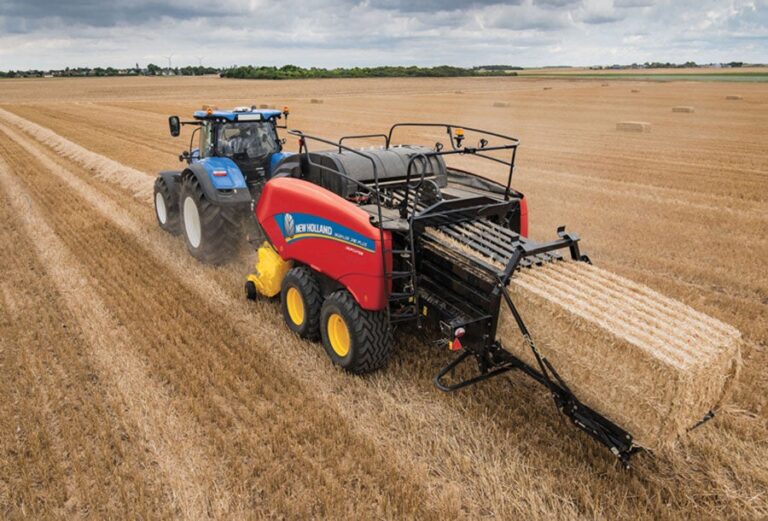CNH Industrial’s decision to temporarily halt farm equipment shipments from North American and European factories has put a spotlight on uncertainties surrounding global trade policies and the political maneuvering of tariff threats. The move, which the company directly links to the planned tariffs instigated by the Trump Administration, signals potential disruptions in the farm equipment supply chain at a time when the industry is already grappling with economic pressures.
The statement from CNH said:
“We are stopping shipments from North America plants and European imports effective today. This is a temporary move until we assess the full impact of planned tariffs on pricing. There are no impacts to production, and parts shipments continue as planned. We will continue to monitor the situation.”
This announcement was somewhat of a surprise, given that CNH’s February earnings call made no mention of a possible shipment pause, and the line item did not make the upcoming summer agenda. However, the company had already been reducing production in late 2024, aiming to lower dealer inventories by over $700 million. In April 2024, the UK-based manufacturer also laid off 200 workers in Wisconsin and announced plans to further reduce its workforce by 2026.
The abrupt nature of this decision suggests CNH is taking a cautious approach, choosing to assess the full impact of tariffs, slated to implement today (barring intervention by Congress), before continuing shipments.
Although President Donald Trump has recently hinted at softening his initial hardline stance, he is moving forward with plans to implement retaliatory tariffs on countries that impose duties or other trade barriers on U.S. imports. Set to take effect on April 2, these tariffs are intended to generate revenue, reshape trade relationships, and encourage companies to shift more of their manufacturing to the United States.
“We may take less than what they’re charging. Because they’ve charged us so much, I don’t think they could take it,” Trump said Monday.
Despite projections from the U.S. Department of Agriculture predicting a nearly 30 percent increase in net cash farm income, the latest Rural Mainstreet Index survey actually projects farm income to decline in 2025, with farmland prices and farm equipment sales falling for the 19th consecutive month.
Bankers in rural areas are bracing for another year of low commodity prices, tighter margins, and reduced exports, creating a difficult environment for equipment purchases. The pause in CNH shipments could further complicate the situation for farmers and dealers who are already struggling with financing and profitability.
Additionally, RMI’s survey shows that only 7.5 percent of bank CEOs support returning to January 2025 tariff levels, indicating continued concern over trade policies — one of the key factors CNH cited in its decision to reassess pricing before resuming shipments.

China, which has faced 20 percent tariffs since Trump took office, has already retaliated with levies on U.S. chicken, wheat, corn, and cotton. Meanwhile, the European Union has prepared its own list of agricultural and consumer products to target if Trump follows through on his threat of steep tariffs.
Many U.S. farmers fear that the tariffs could depress commodity prices and make American products such as corn, eggs, and soybeans less competitive in global markets. If foreign buyers respond with their own tariffs, exports could decline even further.
The last round of tariffs, implemented in 2018, led to an estimated $27 billion loss in agricultural exports, according to USDA economists. Much of that damage came from the trade war with China, which retaliated after Trump imposed sweeping tariffs on Chinese goods.
In 2018, soybeans were amount the hardest hit, according to the USDA.
The American Soybean Association responded last month to the incoming tariffs.
“Farmers are frustrated. Tariffs are not something to take lightly and ‘have fun’ with. Not only do they hit our family businesses squarely in the wallet, but they rock a core tenet on which our trading relationships are built, and that is reliability. Being able to reliably supply a quality product to them consistently,” said Caleb Ragland, American Soybean Association president and soy farmer from Magnolia, Kentucky.


:max_bytes(150000):strip_icc()/corn-6.22-2048x1536-7457f56773ad4c1192f2668931bf6f57.jpg)
:max_bytes(150000):strip_icc()/Soybeans-eggs-blue-sky-blue-7947522ff98d4cc1b7be6e74190cfa13.jpeg)
:max_bytes(150000):strip_icc()/IMG_0870-2048x1365-c17ad7e44c7f4a6bbbf6b6251518204a.jpg)



:max_bytes(150000):strip_icc()/LL20Harvest20sunset-1-2000-4d304a138cb645ba8d29223bfb206a37.jpg)
:max_bytes(150000):strip_icc()/PhotoA-Rustoration_preview-77201b55039b4a60a39427b84b3bb7ba.jpg)
:max_bytes(150000):strip_icc()/20230627-tyler-zimmerman-074_corn-a95bcba138ca417a8815b22c6086ce91.jpg)